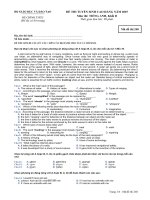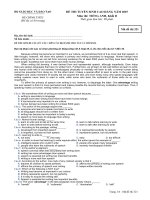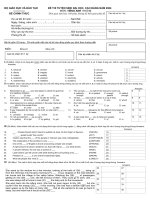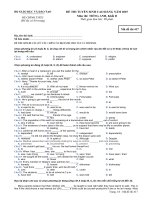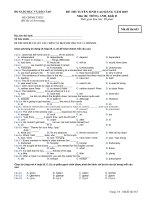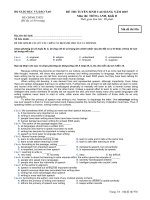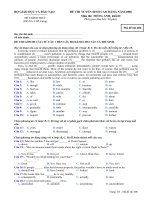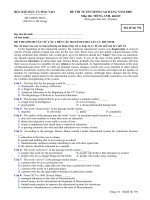tài liệu dạy trực tuyến môn tiếng anh khối 6
Bạn đang xem bản rút gọn của tài liệu. Xem và tải ngay bản đầy đủ của tài liệu tại đây (260.71 KB, 21 trang )
<span class='text_page_counter'>(1)</span><div class='page_container' data-page=1>
<b>WELCOME TO OUR CLASS</b>
Teacher: Le Minh Nguyet
</div>
<span class='text_page_counter'>(2)</span><div class='page_container' data-page=2>
<b>PRACTICE TEST 2</b>
<b>IP. Complete the funny story with the Past Simple of the verbs in </b>
<b>brackets.</b>
It (31. be) Sunday, the day of the big game. The players (32.
arrive)_________ early. They (33. be) excited. Everyone (34.
want) to play.
There (35. be) lots of people in the stadium. They (36. wave)_
_____ and (37. cheer) when the players (38. walk) on to the
ground.
The referee (39. call) the captains to the middle. The referee
(40. ask) . "Where is the ball?" Nobody (41. answer) .
All the players (42. look) at the ground. There (43. be) no
ball. The referee (44. cancel) the game.
was
arrived were
wanted
waved cheered
walked
called
asked
answered.
looked
was canceled
were
</div>
<span class='text_page_counter'>(3)</span><div class='page_container' data-page=3>
<b>PRACTICE TEST 2</b>
S +
+ S +
V
ed
V
+ O?
Did
<b>didn’t </b>
<b> </b>
1. I watched football matches on TV last night.
2. I wrote a letter to my friend two days ago.
1. I watched football matches on TV last night.
2. I wrote a letter to my friend two days ago. Động từ có quy tắc
Động từ bất quy tắc
Vp
+ O
(V
ed1
)
V
3. Mr Tuan was the best student in our class When he was young.
4. The children were in the living room yesterday evening.
3. Mr Tuan was the best student in our class When he was young.
4. The children were in the living room yesterday evening.
S + was
were
not
+ O
Was
</div>
<span class='text_page_counter'>(4)</span><div class='page_container' data-page=4>
<b>PRACTICE TEST 2</b>
<b>I. Choose the correct answer A, B, C, or D for each of the gaps to </b>
<b>complete the following text. </b>
Fiona Campbell was the first woman to walk around the world. She
(45. start) her journey in the UK in 1983 and then in 1985 she (46.
walk) across the USA. In 1988 she (47. go) from Sydney to
Perth in only 95 days. On April 2nd<sub> 1991, Fiona (48. leave) </sub> <sub> Cape </sub>
Town in South Africa. She (49. arrive) in Morocco 29 months
later - a journey of 10,000 miles. Then she (50. walk) across
Europe and (51. finish) her journey in October 1994. She (52.
travel) 19,586 miles and (53. raise) £120,000 for
charity. Fiona also (54. write) <i> a book about her journey called The </i>
<i>Whole Story</i>
started
walked
went
left
arrived
finished
traveled
raised wrote
walked
</div>
<span class='text_page_counter'>(5)</span><div class='page_container' data-page=5>
<b>PRACTICE TEST 2</b>
<b>I. Read the passage, then decide whether the sentences are True or False.</b>
<b>PART 3. READING</b>
I have three good friends: Ba, Lan and Hoa. They like sports. Ba
likes soccer and tennis; Lan likes badminton; and Hoa likes aerobics.
They all like watching soccer on television. Ba often plays soccer in
the afternoon with his classmates at the weekend. Lan plays badminton
twice a week; and Hoa does aerobics on Thursday and Sunday. Lan
and Hoa play sports at the sports club.
1. Ba, Lan and Hoa like the same sports.
2. Ba plays soccer every day.
3. Lan plays badminton three times a week.
4. Hoa does aerobics twice a week.
5. Lan and Hoa play sports at home.
<b>F</b>
<b>F</b>
<b>F</b>
<b>T</b>
</div>
<span class='text_page_counter'>(6)</span><div class='page_container' data-page=6>
"Water polo is a new sport at our school, but we have a good team now. We
practise after school on Thursday at the Northside Pool and we're doing well in the
National Schools Competition.
There are seven players in a water polo team. The game is a bit like football because
each team tries to score a goal with a ball. But in water polo you don't use your feet -
you catch and throw the ball with one hand. And you never stop swimming. A game
lasts 32 minutes, and in that time you swim up and down a 30-metre pool lots of
times. If you aren't fit, water polo isn't the sport for you!
For me, it's great, because I love being in the water and I can swim fast. I also
enjoy being part of a team. We have some excellent players and we're all good
friends. So it's fun, and it's also a fantastic way to get fit."
6. People play water polo .
<b>A. in a stadium </b> <b>B. in a swimming pool </b> <b>C. at the beach </b>
7. His team plays .
<b>A. well </b> <b>B. badly </b> <b>C. in a new competition </b>
8. Water polo players .
<b>A. often play football B. bounce the ball </b> <b>C. doesn't kick the ball </b>
9. In a water polo game, players .
<b>A. can't use their hands </b> <b>B. sometimes swim 30 metres C. swim all the time </b>
10. Leo .
</div>
<span class='text_page_counter'>(7)</span><div class='page_container' data-page=7>
<b>III. Read the story and decide if the sentences are true (T) or </b>
<b>false (F).</b>
On Saturday, Patricia was in the park when she saw a boy on a
mountain bike. He was on the hill when suddenly he fell off his bike.
Patricia ran over to help. "Where's my helmet?" he shouted. It was under a
park bench so Patricia went to get it. Just then another boy ran past, took
the boy's mountain bike and rode away. "Stop!" Patricia shouted. She ran
after the other boy and stopped him. He got off the bike and ran away.
Patricia took the bike back to the boy, "Thank you, Patricia," he said.
"How do you know my name?" Patricia asked. "I live next to you," he
said. "My name's Tom". On Sunday Tom left some flowers on her
doorstep to say "thank you".
11. Patricia was in the street when she saw a boy on a mountain bike.
12. The boy fell off his bike.
13. Another boy rode away with his helmet.
14. Patricia stopped the other boy and took the bike back.
15. Tom gave Patricia a CD to say "thank you".
<b>F</b>
<b>T</b>
<b>F</b>
<b>T</b>
</div>
<span class='text_page_counter'>(8)</span><div class='page_container' data-page=8>
<b>IV. Read the passage, and then answer the questions.</b>
Nam has some plans for this Sunday. First, in the morning he is
going to the sports club to play table tennis with Lan and Ba. Next, in
the afternoon he is going to buy some books at the bookstore and after
that he's going to go swimming with Thanh and Tan. Finally, he is
going to the movie theater with his parents and his sister in the evening.
16. What is Nam going to do on Sunday morning?
18. Is he going to play soccer on Sunday afternoon?
17. What is he going to do in the afternoon?
19. Where is he going in the evening?
20. Who is he going to the movie theater with?
He is going to the sports club to play table tennis with Lan and Ba.
He is going to buy some books at the bookstore.
No, he isn’t.
He is going to the movie theater with his parents and his sister in the evening
</div>
<span class='text_page_counter'>(9)</span><div class='page_container' data-page=9>
<b>V. Read the passage and answer the questions</b>
<i><b>Sun, Sea, and Sport</b></i>
Australians love sport. They play it, they talk about it and they watch it on
TV. Australian weather is perfect for sport, and there are thousands of great
beaches, so swimming is very popular. The population of Australia is only
about 20 million, but many of the best sportsmen and sportswomen in the
world come from Australia.
Young people in Australia are very active. More than 60% of children go
to sports clubs. They also do activities with friends such as skateboarding,
cycling, and rollerblading.
The most popular sports for boys are football, swimming, Australian
Rules football, tennis, cricket, basketball, rugby, martial arts, athletics, and
hockey.
The most popular sports for girls are netball, swimming, tennis, basketball,
gymnastics, football, athletics, martial arts, hockey, and horse riding.
21. What do Australians think of sport?
</div>
<span class='text_page_counter'>(10)</span><div class='page_container' data-page=10>
<b>V. Read the passage and answer the questions</b>
<i><b>Sun, Sea, and Sport</b></i>
Australians love sport. They play it, they talk about it and they watch it on
TV. Australian weather is perfect for sport, and there are thousands of great
beaches, so swimming is very popular. The population of Australia is only
about 20 million, but many of the best sportsmen and sportswomen in the
world come from Australia.
Young people in Australia are very active. More than 60% of children go
to sports clubs. They also do activities with friends such as skateboarding,
cycling, and rollerblading.
The most popular sports for boys are football, swimming, Australian Rules
football, tennis, cricket, basketball, rugby, martial arts, athletics, and hockey.
The most popular sports for girls are netball, swimming, tennis, basketball,
gymnastics, football, athletics, martial arts, hockey, and horse riding.
Because the weather is perfect for sport, and there are thousand of great
beaches
</div>
<span class='text_page_counter'>(11)</span><div class='page_container' data-page=11>
<b>V. Read the passage and answer the questions</b>
<i><b>Sun, Sea, and Sport</b></i>
Australians love sport. They play it, they talk about it and they watch it on
TV. Australian weather is perfect for sport, and there are thousands of great
beaches, so swimming is very popular. The population of Australia is only
about 20 million, but many of the best sportsmen and sportswomen in the
world come from Australia.
Young people in Australia are very active. More than 60% of children go
to sports clubs. They also do activities with friends such as skateboarding,
cycling, and rollerblading.
The most popular sports for boys are football, swimming, Australian Rules
football, tennis, cricket, basketball, rugby, martial arts, athletics, and hockey.
The most popular sports for girls are netball, swimming, tennis, basketball,
gymnastics, football, athletics, martial arts, hockey, and horse riding.
Australian rules football, rugby and cricket
</div>
<span class='text_page_counter'>(12)</span><div class='page_container' data-page=12>
<b>V. Read the passage and answer the questions</b>
<i><b>Sun, Sea, and Sport</b></i>
Australians love sport. They play it, they talk about it and they watch it on
TV. Australian weather is perfect for sport, and there are thousands of great
beaches, so swimming is very popular. The population of Australia is only
about 20 million, but many of the best sportsmen and sportswomen in the
world come from Australia.
Young people in Australia are very active. More than 60% of children go
to sports clubs. They also do activities with friends such as skateboarding,
cycling, and rollerblading.
The most popular sports for boys are football, swimming, Australian Rules
football, tennis, cricket, basketball, rugby, martial arts, athletics, and hockey.
The most popular sports for girls are netball, swimming, tennis, basketball,
gymnastics, football, athletics, martial arts, hockey, and horse riding.
netball, gymnastics and horse ridding
</div>
<span class='text_page_counter'>(13)</span><div class='page_container' data-page=13>
<b>PRACTICE TEST 2</b>
<b>I. Make sentences using the words and phrases given. </b>
<b>PART 4. WRITING</b>
1. which/ you/ do/ sports/ at/do/ school?
2. do/ when/ do/ you/ sport?
3. favourite/ are/ your/ who/ sports stars?
4. do/ you/ go/ how often/ running?
5. team/ sports/ play/ you/ do?
Which sports do you do at school?
When do you do sport?
Who are your favorite stars?
How often do you go running?
</div>
<span class='text_page_counter'>(14)</span><div class='page_container' data-page=14>
<b>PRACTICE TEST 2</b>
<b>I. Make sentences using the words and phrases given. </b>
<b>PART 4. WRITING</b>
6. what/ TV/ you/ do/ on/ sports/ watch?
7. football/ is/ what/ favourite/ your/ team?
8. swimming/ you/ do/ go/ how often?
9. you / practice / table tennis / How often / do / playing?
10. the match / win / your team / Did / last Sunday?
What sports do you watch on TV?
What is your favorite football team?
How often do you go swimming?
How often do you practice playing table tennis?
</div>
<span class='text_page_counter'>(15)</span><div class='page_container' data-page=15>
<b>PRACTICE TEST 2</b>
<b>I. Make sentences using the words and phrases given. </b>
<b>PART 4. WRITING</b>
11. arrive / the stadium / at / What time / you / did?
12. play / games / your family / Does / sometimes / together?
13. you / play / Did / were / when you / marbles / usually / small?
14. a/ the/ sometimes/ students/ picnic/ have.
<b>15. usually/ his/ swimming/ with/ friends/ he/ goes </b>
What time did you arrive at the stadium?
Does your family sometimes play games together?
Did you play marbles when you were small?
The students sometimes have a picnic.
</div>
<span class='text_page_counter'>(16)</span><div class='page_container' data-page=16>
<b>PRACTICE TEST 2</b>
<b>II. Make questions for the underlined part in each sentence. </b>
16.The Olympics Games are held once every four years.
17.The children are playing tug of war.
18.The first Olympic Games took place in Greece in 776 BC.
19.Pelé began his career at the age of 15.
20.I really like swimming because it helps me keep fit.
How often
What
When and where
When
Why
Chỉ mức độ thường xuyên
are The Olympics Games hold?
Chỉ sự việc
are the children doing?
Chỉ thời gian và địa điểm
did the first Olympic Games take place?
did
Chỉ thời gian
did
did Pelé begin his career?
Chỉ nguyên nhân
do you really like swimming?
</div>
<span class='text_page_counter'>(17)</span><div class='page_container' data-page=17>
<b>PRACTICE TEST 2</b>
21.My brother plays football very well.
22.Mai likes playing badminton most.
Badminton is ________________________.
My brother is
Mai’s favorite sport.
23.Sports and games are very important in children's lives.
Sports and games play_________________________
24.Children take part in many after-school activities when school finishes.
Children do _______________________________
25.Lan is very good at basketball.
Lan can _________________________________ ?
an important role in children's lives.
many after-school activities when school finishes.
play basketball very well.
<b>II. Finish each sentence so that it means the same as the </b>
<b>sentence before it.</b>
a good footballer
S + V(s,es) + O +
Adv.
S +
am
is +
are
(a/
</div>
<span class='text_page_counter'>(18)</span><div class='page_container' data-page=18>
<b>PRACTICE TEST 2</b>
26. It is not necessary for you to finish all your work today.
27, How much are these rackets?
How much do ____________________.
You don’t have
These rackets cost?
What’s the matter with your car?
What _________________________
29, My mother can cook very well
My mother is_______________________________
30. We should get up early everyday.
We had _________________________________ .
is wrong with your car?
is a good cook.
better get up early everyday
<b>II. Finish each sentence so that it means the same as the </b>
<b>sentence before it.</b>
to finish all your work today.
How much are Ns?
</div>
<span class='text_page_counter'>(19)</span><div class='page_container' data-page=19>
<b>PRACTICE TEST 2</b>
S +
<b>Should = had better: được dùng để khun ai đó nên hoặc </b>
<b>khơng nên làm gì</b>
should
had better
+ V + O
You should do your homework before going to school.
You had better do your homework before going to school.
You should do your homework before going to school.
You had better do your homework before going to school.
You should not do your homework before going to school.
You had better not do your homework before going to school.
</div>
<span class='text_page_counter'>(20)</span><div class='page_container' data-page=20>
<b>PRACTICE TEST 2</b>
<b>PART A. LISTENING </b>
<b>I. Listen to some dialogues between a caller on the phone and a </b>
<b>secretary. As you listen, write the telephone numbers and names in </b>
<b>the spaces below.</b>
<b>. 1. A: Is that _____________ ?</b>
B: Yes, Can I help you?
A: I’d like to speak to
__________, please.
2. A: Hi. Is that _________?
B: Yes, Who do you want to
speak to?
A: ____________, please.
3. A: Hello. Is that ________ ?
B: Yes, Who do you wish to
speak to?
A: ____________, please.
4. A: Good morning. Is that
___________ ?
B: Yes, Can I help you?
A: I’d like to speak to ________,
please.
5. A: I’m sorry to disturb you, but
is that ______________ ?
B: Who do you want to speak to?
A: ____________, please.
</div>
<span class='text_page_counter'>(21)</span><div class='page_container' data-page=21></div>
<!--links-->
